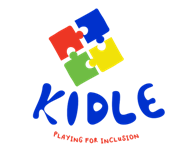The KiDLE project aims to support the inclusion of migrant children/pupils in new school environments by co-creating 5 intercultural board games and integrating them into a digital gaming pack. The project seeks to build educators’ and parents’ capacity to use games for children’s learning and development, implement the gaming pack through gaming events, and raise awareness about the role of cross-cultural games in early childhood education towards supporting inclusion. The project will develop 5 such games and integrate them into a gaming pack that will also be digital and multilingual. Furthermore, the development of the game will take place through a process of co-creation, with parents and children (migrant/local), as well as teachers in each country designing the games.

Specific Objectives and Activities
Given this general aim, the specific objectives of KiDLE are:
Specific Objective 1: To co-create 5 intercultural board games (one per country) with 8 parents, 8 teachers, and 8 children per country.
Specific Objective 2: To integrate all games into one gaming pack, translate them to all partner languages and one major migrant language per country, and create a digital version of the game.
Specific Objective 3: To implement the KiDLE gaming pack through gaming events in each country but also at a transnational level that sees groups from all countries playing the games online.
Specific Objective 4: To build the capacity of educators and parents in each country to use games for their pupils’ and children’s learning, development, and interactions.
Specific objective 5: To raise awareness among local and international audiences about the role of games in early childhood education, and the value of a cross-cultural game as a fundamental building block for inclusive educational systems. Transfer that knowledge to the policy-making level.
Target Groups
Children
- Children aged 4–8 with a migrant background
- Local children aged 4–8 with limited exposure to other cultures
- Children with learning needs who would benefit from an inclusive and diverse learning environment
Parents
- Migrant parents
- Local parents interested in promoting intercultural exchange and diversity in their children’s education
- Parents with children in the relevant age group who may have limited knowledge of the local education system
Educators
- Preschool and primary school teachers interested in developing skills to promote diversity and inclusion
- Staff working with children during after-school programs or extracurricular activities and interested in promoting intercultural exchange and diversity
Community organizations
- Non-profit organizations that work with immigrant communities and support cultural exchange and inclusion
- Local and European government bodies that have an interest in promoting intercultural exchange and diversity in their communities
Project Results
5 Intercultural board games
The first result of the project will be the creation of 5 intercultural board games that will later be integrated into a digital intercultural gaming pack. A significant aspect of this will be co-created with key stakeholder groups (in each country) consisting of teachers, parents, and children. The draft intercultural games will define the rules and playing process of the game and basic features regarding its artwork – e.g. colours, shapes, cards, pictures, characters, etc. Then, a digital version of the games will be made accessible on the project website.
Board games handbook
A short Handbook available in English & partner languages explains how the gaming pack can build children’s skills (communication, language, learning, and others) and provide pedagogical value.
Intercultural Play in Practice
Organisation and implementation of 5 gaming events per country (25 in total) that will take place at a national level and 5 Virtual gaming events that will take place at a transnational level (all countries together). An additional, but also important, result of these results will be the in-school pedagogical seminars. These will be seminars in 5 schools per country, wherein the handbook created above will be implemented in a “train-the-trainer” type of setting.
Project Partners
The consortium is made up of 6 organizations
• Iscte – Instituto Universitario de Lisboa (Portugal – Coordinator
• CIIM INNOVATIONS LIMITED / UoL (Cyprus)
• InterAktion – Verein für ein interkulturelles Zusammenleben (Austria)
• Eurospeak Limited (Ireland)
• Public kindergarten of Agios Spyridon (Cyprus)
• ODISEE (Belgium)
Project duration
The “Kidle: Developing an Intercultural Game as a Pedagogic Tool for the Inclusion of Pupils with Migrant Backgrounds in New Learning Environments” project, co-funded by the European Union under Erasmus+ KA220-SCH-Cooperation partnerships in adult education and with code 2023-1-PT01-KA220-SCH-000154686, runs from 01.12.2023 to 30.11.2025.
Visit our website, and follow us on social media
Website: coming up soon!
Facebook: @ Kidle Project
LinkedIn: @KidLe Project

